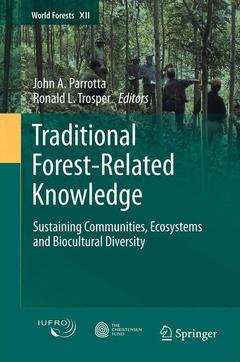Description
Traditional Forest-Related Knowledge, 2012
Sustaining Communities, Ecosystems and Biocultural Diversity
World Forests Series, Vol. 12
Coordinators: Parrotta John A., Trosper Ronald L.
Language: English
Subjects for Traditional Forest-Related Knowledge:
Publication date: 11-2013
622 p. · 15.5x23.5 cm · Paperback
Publication date: 10-2011
622 p. · 15.5x23.5 cm · Hardback
Description
/li>Contents
/li>Comment
/li>
Exploring a topic of vital and ongoing importance, Traditional Forest Knowledge examines the history, current status and trends in the development and application of traditional forest knowledge by local and indigenous communities worldwide. It considers the interplay between traditional beliefs and practices and formal forest science and interrogates the often uneasy relationship between these different knowledge systems.
The contents also highlight efforts to conserve and promote traditional forest management practices that balance the environmental, economic and social objectives of forest management. It places these efforts in the context of recent trends towards the devolution of forest management authority in many parts of the world.
The book includes regional chapters covering North America, South America, Africa, Europe, Asia and the Australia-Pacific region. As well as relating the general factors mentioned above to these specific areas, these chapters cover issues of special regional significance, such as the importance of traditional knowledge and practices for food security, economic development and cultural identity. Other chapters examine topics ranging from key policy issues to the significant programs of regional and international organisations, and from research ethics and best practices for scientific study of traditional knowledge to the adaptation of traditional forest knowledge to climate change and globalisation.
Dedication
Preface
Acknowledgements
1. Introduction: The Growing Importance of Traditional Forest-Related Knowledge
2. Africa
3. Latin America-Argentina, Bolivia, and Chile
4. Amazonia
5. North America
6. Europe
7. Russia, Ukraine, the Caucasus, and Central Asia
8. Northeast Asia
9. South Asia
10. Southeast Asia
11. Western Pacific
12. Globalisation, Local Communities, and Traditional Forest-Related Knowledge
13. Traditional Forest-Related Knowledge and Climate Change
14. Ethics and Research Methodologies for the Study of Traditional Forest-Related Knowledge
15. The Unique Character of Traditional Forest-Related Knowledge: Threats and Challenges Ahead
Subject Index
Author IndexProvides an up-to-date summary of the emerging field of traditional forest management
Includes global coverage of traditional forest management
Offers a highly relevant interdisciplinary approach to tackling current issues in natural resource management and policy




